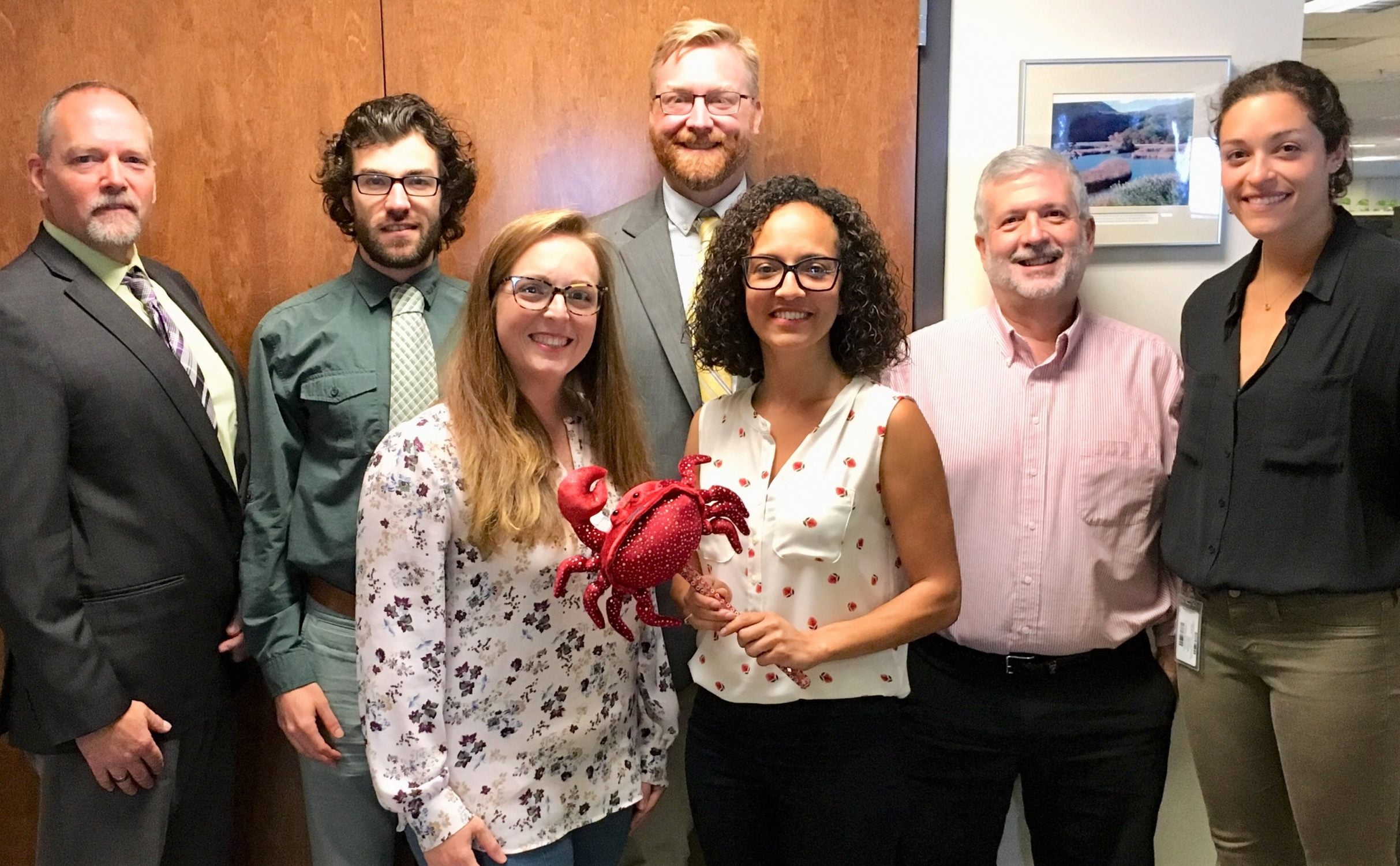Photo: Jeff Herter, Mikael Cejtin, Katherine Hogle, Mike Snyder, Kisha Santiago-Martinez, Peter Clouse, Leah Feldman
As climate change intensifies and extreme weather becomes commonplace, New York state is demonstrating national and global leadership. Governor Cuomo has taken decisive action to lead the fight against climate change and protect our environment for generations to come. With the passage of the Community Risk and Resilience Act in 2014 and the landmark Climate Leadership and Community Protection Act in 2019, New York state now has the most ambitious climate policies in the nation, with a target of 100% clean electricity by 2040 set into law. Under the leadership of Kisha Santiago-Martinez, Deputy Secretary of State of New York and Chair of MARCO, the Department of State’s Office of Planning, Development and Community Infrastructure (DOS OPDCI) is playing a crucial role in State efforts to address climate change, particularly in the coastal and marine context.
The threats of ocean acidification, declining water quality, rising sea levels, and species and habitat shifts are all compounded or caused by climate change. To get at the heart of the problem, New York seeks to cut greenhouse gas (GHG) emissions as quickly as possible by transitioning from fossil fuels to clean and renewable energy sources. One promising energy source for the state and region is the burgeoning offshore wind industry. With the passing of the Climate Leadership and Community Protection Act (CLCPA), New York recently upped its already ambitious target for offshore wind energy to 9000 MW by 2030. Like any worthy goal, meeting this target comes with its challenges. The Mid-Atlantic Ocean is a busy place, and offshore wind development must coexist with marine life, commercial fisheries and shipping. DOS OPDCI plays a key role in ensuring balanced outcomes in the offshore wind space, coordinating with other agencies, states, and the federal government to advance this vital industry without compromising ocean health and resources.
While laying the groundwork for a new energy system and low carbon economy, New York is also investing heavily in long-term resilience and adaptation to the ongoing effects of climate change. In 2012, Superstorm Sandy left New York City partially underwater and made the need for adaptation painfully clear. Governor Cuomo answered in 2014 with the Community Risk and Resilience Act, or CRRA. CRRA requires state agencies to consider future physical climate risks in their permitting, funding and regulatory decisions, a need that DOS OPDCI has long recognized and adhered to. To inform agency decisions, the State adopted official sea level rise projections that it will update every five years according to best available science. This information is critical to DOS OPDCI’s coastal risk assessment tool, which allows coastal communities to identify and prioritize vulnerable assets.
DOS OPDCI recently completed another major component of CRRA in the form of a package of model local laws for resilience. New York municipalities will use these model laws to make their communities safer and better prepared for storm surge, flooding and sea level rise. The laws explicitly recognize that the keys to community resilience are wise land use and designing with nature and the future in mind. This means building smarter, better managing stormwater, steering development away from hazardous areas, and protecting and restoring naturally resilient ecosystems. As manager of New York’s coasts and a partner of waterfront communities throughout the state, DOS OPDCI is actively promoting and employing these strategies for resilience.
New York Management Board Team
New York brings a strong team to MARCO, with many years of experience working on climate change and other ocean issues. The team includes:
Kisha Santiago-Martinez: Deputy Secretary of State, Chair of MARCO
Michael Snyder: Ocean and Great Lakes Program Manager, MARCO Management Board alternate, MACO Steering Committee member
Peter Clouse: Policy Analyst, Ocean and Great Lakes Program, MARCO support and research, Co-Lead New York Maritime Technical Working Group
Jeff Herter: Coastal Resources Specialist 3, Mid-Atlantic Ocean Data Portal Team Member, MARCO Ocean Mapping and Data Team member
Christie Mazzeo-Pfoertner: Technical Specialist, Ocean and Great Lakes Program, MARCO Communications Team member
Mikael Cejtin: Empire Fellow, MARCO Communications Team member, MARCO support and research
Katherine Hogle: Coastal Resources Specialist 1, MARCO Communications Team member
Leah Feldman: NOAA Coastal Management Fellow

